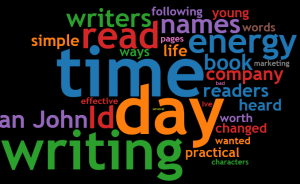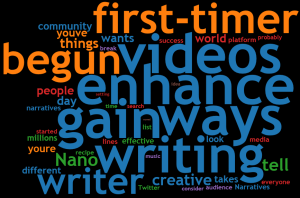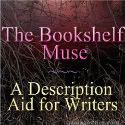 Here you will find a selection of the best of the blogsphere from the past week. Starting this week you’ll find a NaNoPrep section about halfway down. Grab your coffee, straighten the glasses or spritz those contacts and above all – enjoy!
Here you will find a selection of the best of the blogsphere from the past week. Starting this week you’ll find a NaNoPrep section about halfway down. Grab your coffee, straighten the glasses or spritz those contacts and above all – enjoy!
Inform & Inspire
James Clear: How Willpower Works: The Science of Decision Fatigue and How to Avoid Bad Decisions. “Why do we make unhealthy and unproductive choices — even when we know we should do better? If you ask most people, they will say that poor choices are a result of a “lack of willpower.” But research from Columbia University is beginning to reveal that willpower doesn’t quite work that way.”
Jami Gold: Being a Writer: Commitment vs. Self-Doubt. “Being committed to our writing career requires time. We spend thousands of hours learning the craft, understanding how the publishing industry works, and drafting and revising our words.”
Gary Korisko: How to Find Clarity & Confidence as a Writer. “You’re sitting there staring at your latest piece on the computer monitor and find yourself asking, “Is this any good?” It’s gut wrenching to have to ask yourself a question like that, isn’t it? Even more painful is to realize you honestly don’t have a good answer.”
Bob Mayer: The Author’s Marathon: 10 Things To Remember. “It’s a marathon, not a sprint. It’s become a refrain of experienced authors to those rushing into the “gold mine” of self-publishing.”
Writing
Janice Hardy: 4 Tips to Solve 99% of Your Writing Problems. “I’m a huge believer that mastering point of view (POV) will solve 99% of common writing problems. If a writer understands POV, then showing comes naturally, description is easier to write, character goals are clear, the stakes are personal, and thus stories feel more organic.”
Roz Morris: How to switch point of view without confusing the reader. “One of the deadly sins of writing is the ‘head-hop’ – inconsistency with the narrative point of view. The writer will be following one character’s perspective, then forgets to keep to it, or switches to another in a way that creates a logic hiccup.”
Marcy Kennedy: Are You Writing in the POV You Think You’re Writing In? “Point of view problems are the most common problems I see as a freelance editor. And I’m not surprised. Point of view is a difficult concept to master, yet it’s also the most essential.”
Darcy Pattison: Awful First Draft: It’s Hard to Trust the Process. “I am in the midst of a truly awful first draft. Really. I have NEVER written such a bad first draft.
This is a sequel and it must be written to roughly follow an outline, but the outline seems sorta dead.”
Jodi Renner: Concrete Tips for Developing an Appealing Voice in Your Fiction. “In a nutshell, the ideal “voice” is that natural, open, charismatic tone and style that pull us in and make us feel like we know the characters well — and want to get to know them better! A strong, compelling voice will bring your characters and story to life on the page. Voice is personality on paper.”
Two Fantastic Plotting Posts from Janice Hardy
~
~
Shannon Donnelly: Scene Arcs. “Everyone knows there’s a story arc—story goes up in tension, reaches a peak, and falls down. And there are character arcs, too, since story is character and character is story. But what about your scene arcs? That’s right—every scene needs an arc.”
Shawn Coyne: The Hierarchy of Needs. “Why is understanding the concept of “need” such an important part of Storytelling? It is because the most meaningful stories operate on two levels, the external and the internal, the conscious and the unconscious. The external story is on the surface. External events are driven by outside forces. Personal outside forces (like a femme fatale) and extra-personal outside forces (like the LAPD). Your lead protagonist’s external story moves backward or forward according to his moment to moment success pursuing his conscious object of desire, his “want.”
Writer Support
Anne R. Allen: The Laws of the (Amazon) Jungle—Eight Rules Authors Need to Know to Stay Safe. “Everybody tells authors we must use social media to have successful careers in the E-age, but nobody talks much about the dangers that lurk here. Here’s the thing: the Internet is still the wild frontier. And it’s so huge nobody’s quite sure how to police it.”
Hugh Howey: Making a living as an author(s)? “Remember Franklin W. Dixon? What about Carolyn Keene? Both had productive and profitable writing careers. And neither of them ever existed. What is the recipe for writing success? Steady and reliable releases. Look at the top authors across both indie and traditional methods and you’ll find a stream of books that keep themselves in the public consciousness while delivering what’s expected of them. One book a year is not enough to launch a career. I’ve seen indie authors hold back their books until they have enough stored up for monthly releases, just to give themselves a better chance.”
Joe Konrath: Konrath Talks Numbers and Gives a Few Pointers. “One thing I’d like expound upon is that inspiration comes in many forms, and while I’m grateful to have inspired many writers, and humbled when they thank me, I encourage people to use this blog and my words as resource, but not as gospel. I’m just a writer trying to figure things out. Sometimes I do, and sometimes I’m a bit ahead of the curve, but my success still comes down to luck. I believe, if you work hard, you can also improve your chances at luck.”
Susan Spann: Own Your Business As You Own Your Book. “You wouldn’t start a new job by saying, “hey, Mr. Boss, go ahead and pay me a pittance percentage from whatever you have left over after you take out all your other expenses, and while you’re at it, don’t bother telling me about my job expectations. I’ll gladly clean the toilets (with a toothbrush) and there’s really no need to let me know why you’ve paid me or not at the end of the month – I’ll totally trust your judgment.”
NaNoWriMo Prep!
Kristen Lamb: NaNoWriMo—Training Lean, Mean, Writing Machines. “NaNo is a lot like a military bootcamp. Many who sign up for military service aren’t in the fittest condition. Sure, we might meet the weight requirements (or get a waiver), but most of us don’t start out being able to knock out a hundred pushups on the spot. We likely have little experience running ten miles with a heavy pack of gear on our backs.”
Cate Russell-Cole: NaNoWriMo: Links, Resources, Articles and a Nonfiction Alternative. “Because of the limited writing window, the ONLY thing that matters in NaNoWriMo is output. It’s all about quantity, not quality. This approach forces you to lower your expectations, take risks, and write on the fly.”
Also from Cate: NaNoWriMo: Planning and Tracking Tools. “I was involved in NaNoWriMo last year. These are some of the most useful tools people were looking for in the lead up to the big month. I hope you find them useful.”
Jami Gold: NaNo Prep: Do You Know What to Plan in Advance? “Posts abound this time of year about planning for NaNo so your story will end up as a decent first draft. But do you know what kind of planning will help you the most?”
Chuck Wendig: Welcome To NaNoWriMo Prep School, Word-Nerds. “If you are partaking, I’ll be here all November, and I think I’ll keep the blog posts during that time shorter and sweeter — a month’s worth of motivational boots-in-your-boothole to keep you on track and slugging away at the word count.”
Alexandra Sokoloff: Nanowrimo Prep: First, You Need an Idea. “The thing is, “Where do you get your ideas?” is not the real question these people are asking. The real question is “How do you go from an idea to a coherent story line that holds up – and holds a reader’s interest – for 400 pages of a book?”
Also from Alexandra: Nanowrimo Prep: The Three-Act, Eight Sequence Structure. “The real secret of film writing and filmmaking, that we are going to steal for our novel writing, is that most movies are written in a Three-Act, Eight-Sequence structure. Yes, most movies can be broken up into 8 discrete 12-15-minute sequences, each of which has a beginning, middle and end.”
And one more from Alexandra (can you tell she is one of my silent mentors *smile*): Nanowrimo Prep: The Index Card Method and Story Structure Grid. “Get yourself a pack of index cards. You can also use Post-Its, and the truly OCD among us use colored Post-Its to identify various subplots by color, but I find having to make those kinds of decisions just fritzes my brain. I like cards because they’re more durable and I can spread them out on the floor for me to crawl around and for the cats to walk over; it somehow feels less like work that way. Everyone has their own method – experiment and find what works best for you.”
Publishing
Dean Wesley Smith: The next two parts of Dean’s Killing the Sacred Cows of Publishing are out: #5… Book as Event. AND #6 Selling to a Big Publisher Insures Quality. Highly Recommended Reads!
Marketing
Dan Blank: How to Create Word of Mouth Marketing For Your Books? Be Awesome. “Again and again, we hear evidence that “word of mouth” is the way that people hear about books. So let’s think this through: how do you create more word of mouth marketing around your books?”
Joan Rylen: Make Your Mark with these Marketing Tips. “It doesn’t matter if you’re self-publishing or going traditional, one thing is for sure – marketing yourself is a must. Many cringe at the thought, but there are some ways to make it less painful and more productive.”
Courtney Gordner: How to use Pinterest to Promote Your Book. “Pinterest takes the concept of a personal bulletin board and applies it to an online forum, allowing members to create multiple boards about various topics on which they can “pin” as many lists, pictures, videos, and links as they desire.”
Technology
Ava Jae: How to Use Scrivener’s Cork Board. “The cork board is actually the feature that sold me as far as buying Scrivener goes, and what I love about it is that it allows me to combine my plotting with flashcards method that I’ve grown to adore over the years, with the simplicity and beautiful organization of the computer. (Plus the lack of cramping hands is a pretty nice bonus, too).”
Dianna Dilworth: App Annie Adds eBook Intelligence. “App Annie, an analytics agency that provides insights into app data, has expanded its services and is now providing eBook statistics for publishers and authors.”
Also from Dianna: Mobile Path to Purchase: INFOGRAPHIC. “Seventy-three percent of smartphone owners use their devices to shop for products this year, up from 34 percent last year, according to a new report by Local Corporation called ”Mobile Momentum: Spotlight on the Mobile Local Shopper.”
Resource Heaven
Gabriela Pereira: Announcing New Writing Resources at DIY MFA. “We’ve introduced the DIY MFA reading and community resources, but in the end, it all comes down to writing. Sooner or later writers need to get their backsides in the chair and do the work. To that end, we’ve created a go-to list of writing resources here at DIY MFA so that you to help you master the craft, boost your creativity and get motivated.“
 I find myself at a moment of reflection on the backside of NaNoWriMo 2015 (yes, I completed the 50k. thank you), and so thought this a good time to address the past of this blog.
I find myself at a moment of reflection on the backside of NaNoWriMo 2015 (yes, I completed the 50k. thank you), and so thought this a good time to address the past of this blog.














